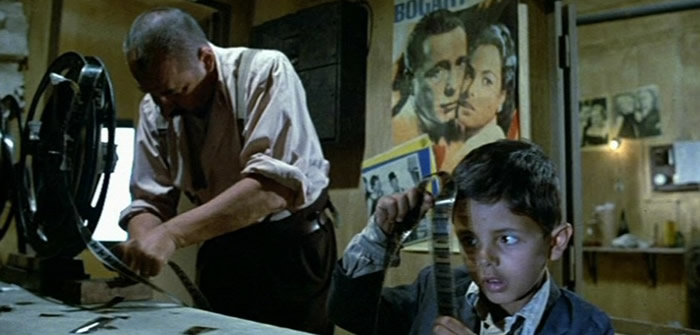In November 2014, I was lucky to meet the great Giuseppe Tornatore, director of the Cinema Paradiso and a supporter of Cinema Without Borders Foundation mission, for the second time in Los Angeles and interview him. The occasion was celebration of the 25th anniversary of Cinema Paradiso release at the Italian Cultural Institute of Los Angeles. Mr. Tornatore was a kind and humble man, answering all the questions even he seemed to be very tired from his long travel from Italy to Los Angeles. He knew our International Editor, James Ulmer, himself a public figure, and he was aware of our love for Cinema Paradiso, an evidence of it, James’ article: Entering PARADISO: A Guide to Inhabiting Your Favorite Film
I still watch Cinema Paradiso every now and then, I may have have watched it over sixty times and every time I discover something new in it. Watching Cinema Paradiso gives me a relief in mind and like an old wine over time this films becomes richer and richer.
The following video shows my in person interview with Giuseppe Tornatore in 2014:
(A year prior to conducting the above interview, James Ulmer and I met Giuseppe Tornatore, after a press screening of the The Unknown Woman, La Sconosciuta in 2013 for an interview about making that film.)
But the main reason I loved Cinema Paradiso so much, was my experience working in a projection room in a movie theater when I was a young child. I wrote my memories of those days after I watched Cinema Paradiso for the first time. Here is a part of it :” I started my work in an open air movie theater by selling sandwiches, cookies and cigarettes to the drunkards and prostitutes who frequented the midnight show. It was not long before I encountered Misha-Dracula, the vampire projectionist of the open air theater. He was a middle-aged Armenian who spent most of his time in a drunken stupor. Many years before, while showing Nosferatu over and over again for several months, he came to believe that he himself was, in fact, a prince of darkness. He developed an aversion to garlic and the sign of the cross, while his reflection, so he swore, disappeared from every mirror. At least, he was unable to recognize his own reflection. Whenever asked why, if he was in fact a real vampire, he did not drink blood, he would wearily reply that he had lost his appetite.
Misha, who lived in the projection booth, provided hours of amusement each day for the otherwise bored street kids. First, they amused themselves by throwing cloves of garlic into his small room. When he would appear at the window to yell and frighten them away, the kids would wiggle shards of broken mirror reflecting sunshine into his face and making the sign of the cross with their fingers, laughing at his dramatic responses.
I will admit that I, too, joined in these pranks -at least once. But, the sight of Misha quietly crying to himself caused something inside of me to snap. At that instant I began to fight the other kids back with a kind of holy vengeance. It was then that the games ended forever.
Like the young boy in Cinema Paradiso, I was fascinated by the projection booth. One day, while prowling around inside the small room, examining the equipment, I came face to face with the monster himself. I immediately offered him my blood –if only he will teach me his trade.
Count Misha replied that, according to a vampire’s code of honor, he could never drink the blood of a child. But, in return for the favor of driving away the annoying street kids, he would teach me how to “light up the screen.” It was in this way that we became life long friends.”
Bijan Tehrani

